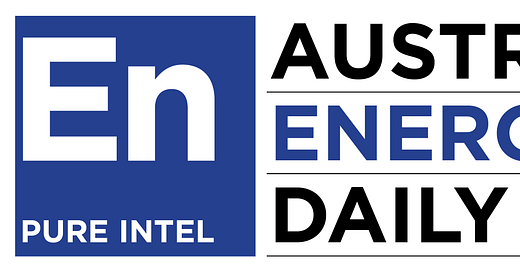Day 88: 'Gradual deterioration'
An introductory weekday newsletter from Schwartz Media. Counting the days since Australia had an energy policy.

Good morning and welcome to day 88.
Today in summary: a Senate select committee on ‘Fair Dinkum Power’ is on the way; the CEO of Spark Infrastructure says wholesale costs, not network charges, are causing higher power prices; and Chevron has failed to sequester millions of tonnes of CO2 from its Gorgon LNG project.
— Sophie
Today’s policy spin level: 💨💨💨
Please don’t keep Australian Energy Daily to yourself. Forward this email to your colleagues and encourage them to sign up for free here.
The Senate will establish a ‘Fair Dinkum Power’ select committee to look at the role of customers in Australia’s energy market, after a motion by Greens Senator Sarah Hanson-Young. The proposal was passed with amendments which removed a mandate for the select committee to look into the potential for state-owned energy companies to “increase consumer empowerment, including through appropriate regulatory engagement and industry advocacy policies”.
In a press release, Hanson-Young said:
"This inquiry will bust the myths being peddled by the Morrison Government about renewable energy, grid stability and power bills. If Scott Morrison was actually 'fair dinkum' about power, he would let evidence, not ideology, guide energy policy.”
The CEO of Spark Infrastructure, an ASX-listed infrastructure fund which owns A$16.6 billion in energy network assets, says regulatory pressure on network operators has gone too far. Rick Francis told The Australian rising wholesale energy costs, not network charges, were the main cause of increased electricity prices, and pressure to cut costs further would make companies reluctant to invest.
“In terms of maintaining existing networks, if the return is not adequate you may see a gradual deterioration in the level of service. It is not something the networks want to do, but we may well have to go down that path.”
A new report from progressive thinktank The Australia Institute says Chevron’s Gorgon LNG project in WA failed to sequester millions of tonnes of CO2 in its first two years of operation, making it harder for Australia to meet its emissions targets.
Chevron should have captured 80% of emissions from an underwater gas field and stored them in an underground reservoir, but is yet to begin. The Guardian reported:
“A Chevron spokeswoman said technical issues were identified in the commissioning of the storage project and modifications were under way. She said it was expected underground injection would begin by March.”
The Commentariat
Nobel laureate Joseph Stiglitz - who is currently on a speaking tour of Australia as he visits to receive the 2018 Sydney Peace Prize - writes in the Sydney Morning Herald about Juliana v. the United States, a lawsuit brought by 21 young people against the US Government which they claim has violated their constitutional rights by allowing fossil fuel production to continue.
Stiglitz, who is an expert witness in the case, says:
“Government procedures for discounting future events mean that the wellbeing of future generations is systematically being downplayed. The Trump administration has been using a 7 per cent discount rate. That means that a dollar today is viewed as 32 times as valuable as a dollar spent 50 years from now.
“In essence, the Trump administration is saying, as are governments in some other countries, “Our children count for very little, and our children’s children count for essentially nothing.” Climate change’s effects are long-lasting. Today’s pollution will affect our children’s children. No just society can simply ignore this.”
Three more things
Electricity generation company Tilt Renewables will begin construction of its A$560 million wind farm in Dundonnell, and it will now come with an A$80 million transmission line from AusNet services to connect the line to the grid. The project will start delivering power early in 2020 and the full 336MW will be available by the end of 2020.
Oil and gas giant Woodside is putting the hard word on regulators to help expedite its plans to turn Western Australia’s Burrup Peninsula into a huge gas hub. A surge in global gas demand is triggering new investments, but Woodside Australia senior vice-president Niall Myles told a conference getting the timing right was critical.
"We know the state government grasps the significance and the pace of what we are trying to do and understands the potential benefits for the people of WA, so we look forward to working with them and continuing to work in order to meet the timelines we have set."
The push from Woodside comes as natural gas futures are spiking, and a cold Northern hemisphere winter is expected to make for further price rises. Closer to home, the Queensland government will today open for a tender a large gas field in the Darling Downs, but on the condition it is used solely for domestic manufacturing.


